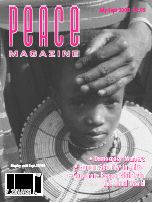
Peace Magazine Jul-Sep 2000, page 25. Some rights reserved.
Search for other articles by Theodore Herman here
Peace studies as a university subject came to the Balkans in November 1992 with my first visit to Macedonia. Fortunately, I met two staff members of the University of Sts. Cyril and Methodius who were already active for peace beyond the campus. As the fighting in Croatia and Bosnia threatened to spread, there was real interest to explore the subject.
In 1993, the two staff members and I presented a Five Year Plan for a Balkans Peace Center for approval. It introduced peace studies as a new multi-disciplinary field that explores the causes of conflict and the conditions of peace.
The Council was far-sighted enough to authorize the program but made no further commitment. Books, services, and funds came from many friends, especially from the Open Society Foundation in Skopje and two anonymous donors abroad. Several foreign governments and U.N. agencies have given grants to the Center.
The Balkan Peace Studies Center (BPSC) came to life through the leadership of a psychology professor, Olga Murdzeva-Skarik, already active with women's groups and with children displaced to Macedonia by the fighting in Croatia and Bosnia. She transformed a cold, cavernous space in the Philosophy Building to non-smoking offices and a peace library, equipped with communications facilities and a busy coffee pot leading to the recruitment of other teaching staff.
Between 1993 and 1998 when the first array of courses were offered, Olga and her husband, constitutional law professor Svetomir Skarik, attended peace conferences around the world, meeting the leaders in the field and bringing many to Skopje to lecture. They began translating key texts into Macedonian. Both speak many languages.
Since 1993 I have gone to Skopje and to other universities in the region several more times, and have frequent contact with them in between. My job is consultant to the center.
This two-year program leads to an M.A. degree in Peace and Development with six postgraduate courses, lasting three months, with about 20 students per term. The students are teachers, journalists, military personnel, sometimes several police officers-all eager to learn about conflict resolution and alternatives to violence for their own work. I hope the program broadens to include undergraduates and to offer practice in building peoples' organizations (NGOs) for peace-organizations where people unite across the deadly barriers that have torn the region apart.
One encouraging change is the spreading interest in the peace studies elsewhere in the Balkans. The director is working with UNESCO, using radio and conferences to reach other universities in the region - Belgrade, Sarajevo, Zagreb, Vienna, and Schlaining in Austria, and Thessalonik.
In the past, the southern end of the Balkans was regarded as poor, backward, and not attractive for investment or cultural change. Skopje's University did not have the prestige of those in the north - Belgrade, Zagreb, Ljubljana. Under Tito's communism for almost half a century, Macedonia was seen as a frontier with Greece where memories of World War II were still strong.
Thus when Yugoslavia began to break apart in 1991, Mr. Milosevic in Belgrade, focusing on the secession of Slovenia and Croatia in the north and the threat of independence in Bosnia and Herzegovina, permitted Macedonia to withdraw peaceably while removing all his troops and equipment in order to impose Greater Serbia. Independent Macedonia received thousands of refugees, along with foreign embassies, troops, and NGOs. One of the hardest places to change was the university - poorly funded with little voice in public affairs. There was little push for meaningful research and innovative instruction.
Theodore Herman is director emeritus, Peace Studies Program, Colgate University, and consultant to the Balkan Peace Studies Center, University of Sts. Cyril and Methodius, Skopje, Macedonia. His address: Box 125, Cornwall, Pennsylvania 17016.

Peace Magazine Jul-Sep 2000, page 25. Some rights reserved.
Search for other articles by Theodore Herman here